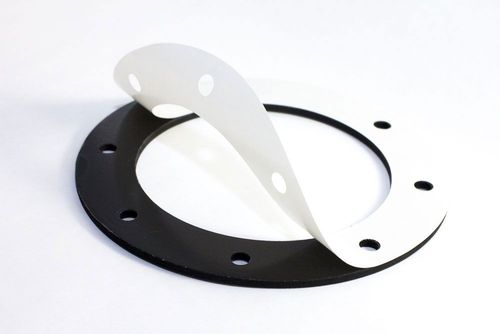
Top 5 Considerations When Selecting Adhesives for Custom Gaskets
Pressure-sensitive adhesive tapes are just as essential to gasket performance as choosing the right foam material. Selecting the best adhesive requires a full understanding of your application — including temperature range, surface energy, bonding environment, and the method of application.
The right adhesive can extend gasket lifespan, improve performance, and even simplify assembly. Here are five key considerations to help you make the best adhesive choice.
Five factors for choosing the right gasket tape
1. Temperature exposure
One of the first considerations to think about in selecting an adhesive for custom gaskets is to establish the temperature range it will be exposed to.
First, it is important to think about both the external and internal temperatures the adhesive will be experiencing on a day-to-day basis. This would include any potential outdoor weather extremes, as well as the internal temperature of the application, that the gasket would be exposed to.
- Acrylic adhesives typically offer excellent high-temperature resistance (often up to 350°F), making them ideal for demanding environments.
- Rubber-based adhesives are suitable for short-term bonding and lower temperatures but may degrade under sustained heat exposure.
2. Surface and substrate condition
To select a proper adhesive, considerations need to be made on the different substrates that will be attached to each other.
The first step is to analyze the properties of the substrate that may affect adhesion. Substrates can be rigid, flexible, smooth, coated with a certain chemical or material, and everything in between. These variables can all influence how well the adhesive performs.
Next, it’s important to account for the type of substrate itself. Metals, coppers, foams, polycarbonates, and a host of other materials can all be found in or around a gasket, so picking an adhesive that performs well with the surrounding materials it will encounter is an important aspect.
3. Method of application
Determining exactly how the adhesive will be applied to the custom gasket system can easily narrow down viable adhesive options.
If the adhesive will be applied by hand, there can be roadblocks to certain methods of application. Would it be feasible to use tape? Maybe a spray adhesive or liquid bonding agents are more practical? If the adhesive will be applied by an automatic process, maybe there is only a handful of feasible adhesive options during production.
Deciding the best means to apply the adhesive will narrow your options.
Die-cut adhesive transfer tapes are often preferred for automated assembly or kiss-cut applications, while spray or brush-on adhesives might be better suited for large surface areas in prototype or low-volume production.
4. Environment of the application
Going almost hand-in-hand with temperature considerations when choosing a gasket adhesive are the environmental factors. Some of the most important to be aware of are:
- Chemical resistance: There is a possibility that the adhesives used in a gasket system could be exposed to the fluids or chemicals that the gasket will be holding in. Are they corrosive or toxic? Certain chemical resistances should be factored in when deciding on a proper adhesive if there is potential for exposure.
- UV: Consistent exposure to UV rays can easily compromise any exposed adhesives that do not have adequate UV resistance.
- Moisture: Moisture from either internal or external sources can come in contact with adhesives in a gasket system and could potentially compromise the seal.
- Function: Will the gasket be static throughout its lifetime? Or will it be exposed to movement and/or vibration? This will be an important factor when selecting a proper adhesive because if movement and vibration are present on a day-to-day basis, specific adhesives will need to be used.
For high humidity or outdoor use, opt for UV- and water-resistant acrylic adhesives like those found in 3M™ VHB™ tape. Silicone adhesives are excellent in chemically aggressive or high-temp environments.
5. Compressional forces
In applications with continuous compressive cycling or vibration, adhesives must maintain bond integrity without slipping, shearing, or degrading. Use adhesives with tested dynamic load performance and shear strength, such as structural bonding solutions from the 3M™ VHB™ tape family.
Let us help you pick the best adhesive for your gasket
Deciding on a proper adhesive for your custom gasket can be a complicated process. Whether you have questions about adhesives used in the gasket system or questions about the gasket itself, we can work with you to find a solution that fits your needs perfectly. SRP is proud to be a Preferred Converter for 3M™ Adhesives and Tapes.
Got a project in mind? Download your specifications in our online form and we’ll get you a fast, accurate quote.
